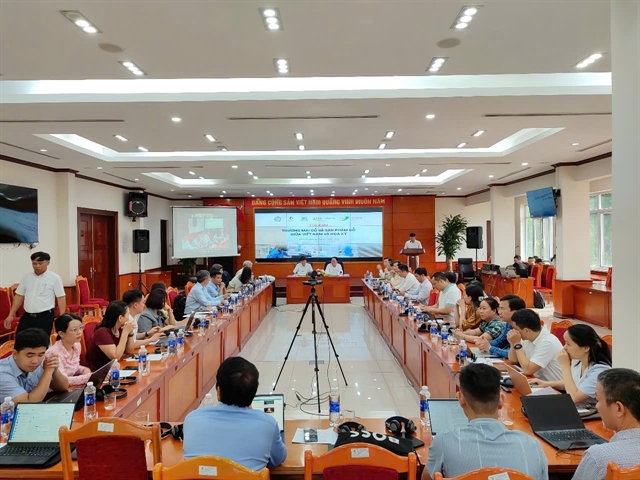 Economy
Economy


|
| View of the seminar. — Photo courtesy of Viforest |
HÀ NỘI — Việt Nam is emerging as one of the leading suppliers of wood and wood products to the US, as well as one of the major importers of American wood, according to a trade seminar held in Hà Nội on Tuesday.
The seminar was organised by the Vietnam Administration of Forestry under the Ministry of Agriculture and Environment, in collaboration Forest Trends and wood associations and businesses.
Việt Nam's exports of wood and wood products to the US reached US$9 billion last year, a year-on-year surge of 24 per cent, said Ngô Sỹ Hoài, vice president and secretary general of the Vietnam Timber and Forest Products Association (Viforest).
The US is currently the largest market, consuming 55 per cent of Việt Nam’s total wood and wood product exports, followed by China (12 per cent), Japan (11 per cent), South Korea (5 per cent), and the EU (4 per cent).
Việt Nam’s main exports to the US include wooden furniture, wooden panels, wooden doors and wood products.
Conversely, Việt Nam imported $316.36 million worth of wood and wood products from the US last year, a 32.9 per cent increase from 2023, accounting for 11.2 per cent of the country’s total wood and wood product imports. The three main items imported from the US are sawn wood, roundwood, and veneer.
Hoài noted that the US required imported wood to be legally sourced, with regulations such as the Lacey Act, export certification, and certification of origin (C/O).
Natural forest logging has been banned in Việt Nam since 2014, as the forestry industry has been shifting towards the sustainable development of plantation forests and a responsible wood industry.
The country's wood supply now primarily comes from three million hectares of plantation forests, mainly consisting of acacia and eucalyptus, and one million hectares of rubber forests.
The area of FSC/PEFC-VFCS certified forests continues to grow. Việt Nam now has 700,000 hectares of commercial plantation forests certified by FSC/PEFC, with the goal of certifying 70 per cent of commercial plantation forests by 2030.
The volume of tropical wood imported into Việt Nam has significantly decreased, from over two million cubic metres (m3) in 2015 to 700,000 m3 last year.
The US is classified as a reliable supplier of roundwood and sawn timber to Việt Nam.
Wood trade between Việt Nam and the US not only contributes significantly in value but also brings additional benefits. With wood and wood products imported from Việt Nam, US consumers enjoy more options for high-quality, reasonably priced, and legally compliant products.
Both sides have also demonstrated effective ways of resolving trade disputes related to wood and wood products, as exemplified by the successful handling of the US Section 301 investigation and various other trade remedy cases.
This positive cooperation trend should continue to be maintained to deliver practical benefits to both countries.
Joe O’Donnell, director of Government and Public Affairs at the International Wood Products Association (IWPA), noted that if Vietnamese companies could import hardwood from the US, this would serve as an advantage in origin documentation.
He also emphasised that Vietnamese businesses should proactively provide information to US consumers to build trust and protect their market share.
At the seminar, businesses and associations also agreed on the need to boost imports of raw wood materials from the US for processing and re-export to the US and other markets.
Associations and businesses are strengthening international co-operation to enhance the image of Vietnamese wood and wood products as transparently and legally sourced within the supply chain.
During the seminar, director of the Vietnam Administration of Forestry Trần Quang Bảo shared that the industry was working with relevant agencies to issue new regulations on issues such as classification of enterprises, origin tracing of forest products, and geographical region definition.
These regulations are expected to be released later this month.
The administration expressed its wish to receive the co-operation and support of associations and the business community, Bảo said.
As the state management agency in charge, the administration was ready to cooperate and engage with associations and businesses and assure international partners that Việt Nam had closed its natural forests and did not use raw materials from natural forests for exports, he noted.
Việt Nam was fully transparent in its supply chain and legal systems. The Vietnamese wood industry has signed and is implementing commitments with major markets, alongside specific action plans, he added. — VNS




